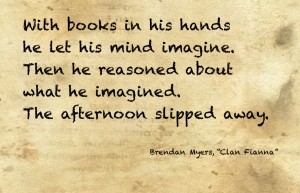Suppose I took a narrow, economic view of what success looks like for a writer who, like me, doesn’t write full-time, but has a day-job (which, let it be stated for the record, I do enjoy). The advantage of an economic view of success is that it’s easy to measure: one need only ask how much money was made selling the books, minus the cost of producing them.
Well, here’s a rough and imprecise balance sheet for how much it cost me to make my Fellwater / Hidden Houses novels.
Incoming:
+ $4,700 netted from Kickstarter, after fees and deductions.
+ around $100 more from direct sales this summer.
Outgoing:
– $550 advertising the project while the fundraising campaign was underway.
– $4,000 for the editor
– $500 for the audiobook version of one of the spinoff novellas
– $900 (approximate) for the work of two artists who illustrated the characters and the heraldry used on the website and in the Kickstarter campaign
– $1000 for the cover designer and interior art designer.
– $1,700 (approximate) sending rewards to the Kickstarter backers.
Result: I lost $3,850. I can’t say I’m surprised by this; I’ve done almost nothing in the last few months to advertise the books, so direct sales have been low. (It’s still depressing and demoralizing, though.)
But that’s only one way to measure success. There are others. Now that the books have been in the reader’s hands for a few months, many of the Kickstarter backers have written to me privately to say how much they enjoyed them. The response has been overwhelmingly positive. For example: J. J. Colvin, a backer from England, wrote this review of Clan Fianna on the book’s Amazon UK page:
It is an ensemble cast piece, with a great sense of each of the major characters being at the centre of their own story, with all of these individual threads weaving a great and complex tapestry of plot. This immediately brings to mind comparisons with Robert Jordan and George R. R. Martin, but for my taste this book exceeds much of the work of both of these super-luminaries…
Robert Jordan – George RR Martin – wow! Reading this, I am overwhelmed, humbled, and excited, all at once. Thus I began to wonder if this is what success really looks like for independent writers.
Not only that: some of the Kickstarter backers offered to create art based on the characters and settings: I’m really looking forward to this, and if each artist permits, I’ll share what they make with everyone on the blog and in the project updates.
Interest in my nonfiction works is picking up, too. Here’s Sable Aradia’s review of “The Other Side of Virtue”: the book is from 2008, but the review is from a few days ago:
This book could be a modern manifesto for humanistic Paganism; but its theories can also be applied to most modern Pagan practice. And it could also be read and enjoyed by humanists and naturalists of any faith. It could possibly even be held up to Neil deGrasse Tyson and Stephen Hawking as an answer on the value of philosophy… I love Brendan’s way of articulating this concept in what I have previously described as “his liquid prose.” His education is apparent through his choice of phrasing; but unlike many other academics, he does not write in technicalities and field-specific terminology. It is easily (and enjoyably) accessible to the layperson…
Imagine someone recommending that Tyson and Hawking should read one of my books! Still, an academic with weird interests like mine, who writes for the general public, in addition to (or instead of) other academics, could hope for no higher praise.
Each book of mine represents thousands of hours of time in researching, thinking, writing, editing, and critical analysis. I’m not exaggerating that time commitment: I keep meticulous records of such things. My nonfiction work is backed by an excellent UK-based publisher, which covers the production costs; my fiction work is entirely in my hands, although with my editor and designer I now have a “team” of sorts. It’s a truly huge burden of labour, for everyone involved. Is all that effort “worth it”? Are we successful? With responses such as the two reviews noted above, I’d like to say “yes”. The books are intellectually and artistically successful, or so it seems right now.
Will they ever be commercially successful? I don’t know – and the business side of being a writer almost always depresses me. A good friend of mine once told me that he had a dream in which Fellwater became just as big as Harry Potter. If that dream doesn’t come true, which seems likely to me, then I can still be a writer and a professor at a small college in western Quebec, and I’ll still have something like an enjoyable life. If it does come true – well, let’s wait and see. (And look for a publicist and a literary agent, in the meanwhile.)
Although many of you, friends and family, have given me so much already this year, I’ve a small favour to ask: this holiday season, please tell someone about my books. Write about them on your social networks and blogs and on the bookseller pages; email them to friends; consider giving them as Christmas gifts to people who you think will enjoy them. As an independent writer and publisher, without the backing of a million-dollar marketing department, I remain dependent upon the goodwill of people like yourselves to help promote my work. And as always, you have my deep and abiding thanks.
So, there it is. I wish you and all your loved ones a happy solstice season (that’s my word for the holiday) and a prosperous and good new year.










